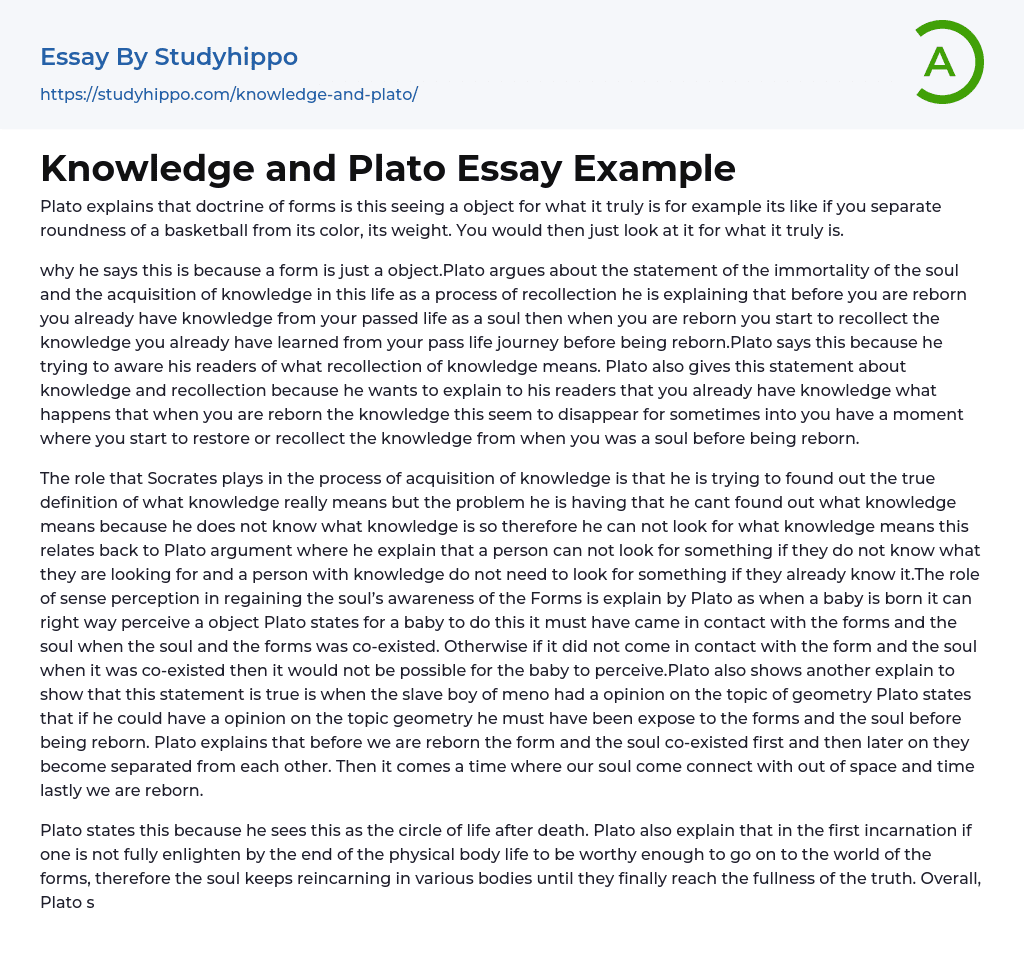According to Plato, the concept of forms involves perceiving an object in its true essence. This means separating its roundness, for instance, from its color or weight and focusing solely on its intrinsic nature.
The reason for his statement is that a form is simply an object. Plato discusses the immortality of the soul and the attainment of knowledge in this life as a recollection process. He explains that before reincarnation, one already possesses knowledge from their past life as a soul. Upon reincarnation, the individual begins to recollect the knowledge they previously learned on their past life journey. Plato's intention is to raise awareness about the recollection of knowledge. Additionally, he asserts this statement about knowledge and recollection to convey that individuals already possess knowledge, but it appears to vanish upon reincarnation until they ha
...ve a moment where they begin to recover or recollect it from their time as a pre-reincarnated soul.
Socrates is attempting to uncover the true meaning of knowledge despite not knowing what it means himself, which aligns with Plato's argument that one cannot search for something without knowing what it is. Additionally, Plato asserts that the sense perception of a newborn allows them to perceive objects due to their prior contact with the coexisting soul and Forms. Similarly, the slave boy's opinion on geometry indicates his prior exposure to the Forms and soul before being reborn. Plato suggests that the soul and Forms coexist before being separated and eventually reconnecting with out of space and time, resulting in rebirth.
According to Plato, the cycle of life after death involves the soul reincarnating in various bodies until it reaches the fullness of truth. Th
aim of the soul is to regain memory of the transcendent world while on earth, as the soul simply forgets where it came from. Although knowledge gained in previous lives is not lost, belief cannot be proven. Plato believes that enlightenment is essential to move on to the world of forms and that the soul reincarnates until this is achieved.
Belief is the acceptance of something as true without proof, based on personal experience. Knowledge, on the other hand, involves understanding something for what it truly is. Knowledge is founded upon certainty, whereas belief remains uncertain until proven. Trust is always placed in factual knowledge, while belief derives from personal opinion rather than objective evidence. Plato recognized this distinction, as knowledge can be validated while belief remains unproven.
The theory of knowledge as recollection, the separate existence of the forms, and the belief in the preexistence of the soul are interdependent. Plato asserts that they all play a critical role in the cycle of life and death, from before we are reborn to after we have passed away. The theory of knowledge as recollection, which involves recalling past experiences after being reborn, is intertwined with the concept of forms and the existence of the soul during its coexistence with forms. The separate existence of forms becomes apparent when they disconnect from the soul during the process of life and death. Belief in the preexistence of the soul highlights our existence as souls before we are reborn and emphasizes that the soul is a separate entity. Furthermore, these theories all contribute significantly to our learning process and represent distinct aspects of Plato's philosophy on life and death.According
to Plato, the concept of the preexistence of the soul is crucial in the cycle of death and life. He argues that it is not only death, but also a new beginning with life, that leads to our rebirth. In this process, we undergo a series of experiences that bring us into contact with the forms and soul during their coexistence, and we lose our memories from past lives before being reborn.
Plato asserts that there must be a cycle of reincarnation as life cannot be just about death, and it must begin anew with a new life.
- Accident essays
- Awareness essays
- Benefits of Volunteering essays
- Challenges essays
- Childhood Memories essays
- Decision essays
- Driving essays
- Event essays
- Excellence essays
- Expectations essays
- Failure essays
- Farewell essays
- Flight essays
- Gift essays
- Growing Up essays
- Ignorance essays
- Improve essays
- Incident essays
- Knowledge essays
- Luck essays
- Memories essays
- Mistake essays
- Obstacles essays
- Overcoming Challenges essays
- Party essays
- Peace Corps essays
- Personal Experience essays
- Problems essays
- Sacrifices essays
- Struggle essays
- Success essays
- Trust essays
- Vacation essays
- Visit essays
- Volunteering essays
- Albert Camus essays
- Aristotle essays
- Carl Jung essays
- Henry David Thoreau essays
- Immanuel Kant essays
- John Dewey essays
- Karl Marx essays
- Machiavelli essays
- Michel Foucault essays
- Plato essays
- Rene Descartes essays
- Rousseau essays
- Socrates essays
- Thomas Hobbes essays
- Afterlife essays




